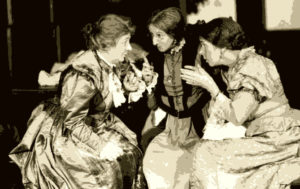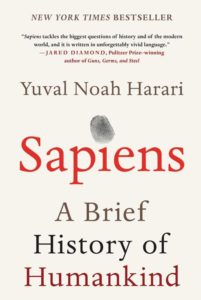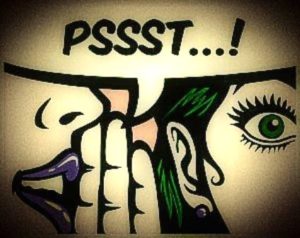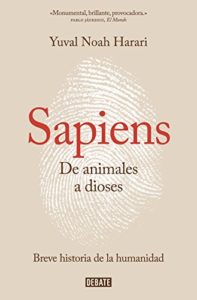How gossiping helped humankind

If I asked you to think of an image that you would associate with the word “gossip”, I imagine most (most men at least) would think of something like the old photo above. The sexist stereotype of normally older women indulging in tittle-tattle, sometimes harmless, sometimes malicious, persists, although the act is a near-universal one regardless of age and gender, and, in all probability, nationality. The word itself has clearly negative connotations – just think of the way we say “I don’t like to gossip but….” (before doing just that – see also “I don’t mean to be rude but…”) or “Do you want to hear some juicy gossip?”, as if the act itself was risqué, almost taboo, hence the gesture of pretending to put one’s hand over one’s mouth.
However, it can be argued that gossiping doesn’t deserve its bad reputation. One such defender of the art of idle talk is the historian, philosopher and best-selling author Yuval Noah Harari. In the early chapters of his fantastic Sapiens – A Brief History of Humankind, he points out that in our hunter-gatherer days, family groups tended to be small, with no more than a dozen or so members. As a result, he supposes, there would have been little need to gossip as everybody would know everybody else’s business anyway. Of course, early human linguistic ability may not have stretched to such concepts, but that’s another matter, and one we’ll never know one way or another; nevertheless, it’s easy to imagine that they had things to say to each other that were more immediate and important to their survival.

However, as we started to settle in permanent villages around 10,000 years ago, the number of people in each settled “tribe” grew considerably. People no longer knew the business of those outside their immediate circle and thus would have been unaware of important information that ensured social cohesion. In Harari’s words “It is not enough for individual men and women to know the whereabouts of lions and bison. It’s much more important for them to know who in their band hates whom, who is sleeping with whom, who is honest and who is a cheat.” And thus gossip came into being. The time spent in this supposedly idle chit-chat helped early village dwellers to forge friendships and hierarchies, which, in turn, helped establish the social order and cooperation that would be needed for their settlement to succeed and grow.
Of course, like before, there’s no way of knowing for certain if this was the case or not, but Harari argues his case very convincingly. Whatever, it’s still nice to know that when you’re passing on some salacious titbit to a friend about your boss, you’re not a shameless rumour-monger but rather tapping into a linguistic phenomenon that has proved essential to human development.

Como el cotilleo ayudó a la humanidad

Si te pidiera pensar en una imagen que asociaras con la palabra “cotillear”, imagino que la mayoría (bueno, la mayoría de los hombres, por lo menos) pensaría en algo como la escena que se ve en la foto vieja arriba. Perdura el tópico machista de las “marujas” disfrutando de los rumores, que pueden ser más bien inocuos o más bien maliciosos, aunque el acto es universal con independencia del género, edad o, con toda probabilidad, nacionalidad. La palabra en sí tiene connotaciones claramente negativas – considera la frase “Sabes que no me gusta cotillear, pero….” (antes de hacer exactamente eso – véase también “No quiero ser grosero, pero…”) o “¿Quieres oír algo suculento?”, como si el acto en sí fuera algo atrevido, casi tabú, de ahí el gesto de fingir tapar la boca.
Sin embargo, se puede argumentar que el chismorreo no merece tan mala reputación. Alguien que defiende tal punto de vista es el historiador, filósofo y autor Yuval Noah Harari. En los primeros capítulos de su libro fantástico Sapiens – De animales a dioses, dice que en nuestros orígenes como cazadores, los grupos de familias solían ser pequeños, con una docena de miembros. Por consiguiente, según él, no hubiera habido mucha necesidad de husmear porque todo el grupo sabría los asuntos de todos los demás. Eso sí, es posible que las habilidades lingüísticas de los primeros humanos no extendiesen a tales conceptos, pero esto sería objeto de otro debate y no podemos saberlo a ciencia cierta. De todos modos, podemos imaginar que tuvieron cosas más inmediatas e importantes para su supervivencia que comentar.

Sin embargo, a consecuencia de empezar a establecerse en asentamientos estables hace alrededor de 10.000 años, el número de personas en cada “tribu” creció sensiblemente. La gente ya no conoció los asuntos de los ajenos a su círculo íntimo y, como resultado, no pudo estar al tanto de la información clave que aseguró cohesión social. Como dice Harari “No es suficiente que los individuos sepan dónde están los leones y bisontes. Es mucho más importante saber quién en su banda odia a quién, quién se acuesta con quién, quién es honesto y quién es un embustero.” Y así nació el cotilleo. El tiempo que se dedicó a estas charlas superficiales ayudó a los primeros habitantes de los pueblos a forjar amistades y jerarquías, lo cual, en cambio, ayudó a establecer el orden social y la cooperación que se necesitó para que su asentamiento creciera con éxito.
Desde luego, como antes, no se puede decir con certeza si las cosas pasaron así, pero Harari argumenta su teoría de manera muy convincente. Sea como fuere, se agradece saber que cuando repites una noticia salaz a un amigo sobre tu jefe, no eres un cotilla descarado sino más bien canalizas un fenómeno lingüístico que ha resultado esencial para el desarrollo humano.